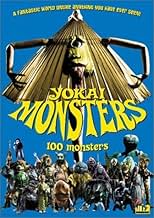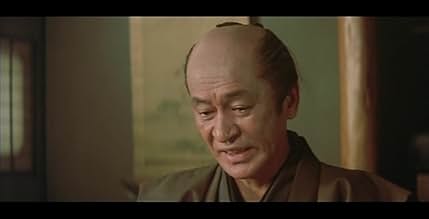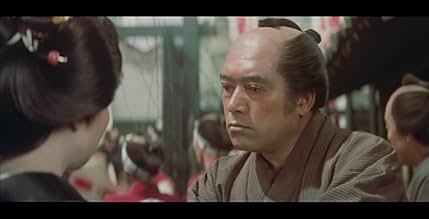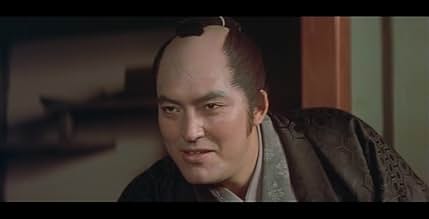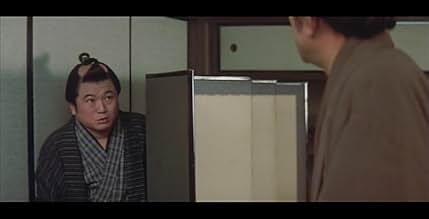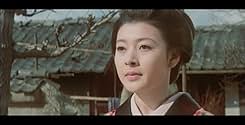IMDb-BEWERTUNG
6,5/10
1093
IHRE BEWERTUNG
Füge eine Handlung in deiner Sprache hinzuThe local yôkai (Japanese spirits) interfere to avenge a murder and thwart the plans of corrupt officials.The local yôkai (Japanese spirits) interfere to avenge a murder and thwart the plans of corrupt officials.The local yôkai (Japanese spirits) interfere to avenge a murder and thwart the plans of corrupt officials.
Empfohlene Bewertungen
Unscrupulous magistrate Tajimaya (Takashi Kanda) uses theft, coercion, violence, and ultimately murder to take over a tenement house and a shrine with the intent of tearing them down. He also uses his leverage to force Ôkubi (Keiko Koyanagi), the beautiful daughter of the tenement's owner (Tatsuo Hanabu) to become his mistress. Tajimaya's actions and disrespect angers the local spirits, the Yôkai, and soon he and his minions find themselves cursed and harassed by monsters. The film, first in a Yokai trilogy from Daiei Film, is an imaginative fantasy with odd imagery (the 'umbrella monster' features prominently in the advertising) superimposed on a typical Japanese samurai adventure. The monsters (a mix of animation, puppets and costumes) are frequently quite bizarre. I am not familiar with Japanese folklore, but I gather that many of the diverse creatures represent traditional tropes (for example: the umbrella monster ('Kasa-obake') and the long-necked woman (Rokurokubi). 'Yokai: 100 Monsters' ('Yôkai hyaku monogatari') is entertaining and offbeat (at least from a 'Western perspective'), and likely a good introduction to yet another fanciful Japanese film genre. Note: I watched an English-subtitled version that, judging from some of the idioms, seems to have been made several years after the original film was released.
Definitely a movie of quite noticeable ups and downs.
To start with the cons/get through the negatives first, it's a bit of a slog at times thanks to pacing issues, the story is unfocused, and there's not enough monster shenanigans.
The pros are that when the monsters do appear on screen, they're a lot of fun, and the effects are quite creative. It's also anti-landlord, which is always good to see, and there are a few very visually appealing and eerie shots here and there.
Plus, the final 15 minutes does admittedly go pretty hard. Just feels a little slow-going to get there at times.
To start with the cons/get through the negatives first, it's a bit of a slog at times thanks to pacing issues, the story is unfocused, and there's not enough monster shenanigans.
The pros are that when the monsters do appear on screen, they're a lot of fun, and the effects are quite creative. It's also anti-landlord, which is always good to see, and there are a few very visually appealing and eerie shots here and there.
Plus, the final 15 minutes does admittedly go pretty hard. Just feels a little slow-going to get there at times.
The first film in a series that inspired the recent Great Yokai War. Directed by a veteran of the Zatoichi series and the excellent samurai/horror/kaiju film, Daimajin, this film is ably done and moves along at a good pace. The plot isn't much as it's a rather typical samurai and upper classes oppress the poor story. It's the yokai element that gives the film something to watch.
The yokai are all clearly rubber marionette puppets or actors in suits so you have to watch with different expectations, sort of a stage show with puppets. It's the design and spooky atmosphere that makes this fun. The final dance of the yokai as they go off into the sunrise is a great scene and made the movie for me.
Not a great film but fun.
The yokai are all clearly rubber marionette puppets or actors in suits so you have to watch with different expectations, sort of a stage show with puppets. It's the design and spooky atmosphere that makes this fun. The final dance of the yokai as they go off into the sunrise is a great scene and made the movie for me.
Not a great film but fun.
100 MONSTERS?! What a great film title, bringing to mind one hundred yokai (traditional Japanese monsters and spirits) wreaking havoc on an Edo-period village. The real film doesn't quite live up to that promise, but it's a fun entry into the '60s Japanese popcorn horror canon.
As is the case in many Japanese flicks from this time, the bad guys are powerful landowners who push around the good guys and take their land, their women and even their lives. But after the lords fail to complete a ritual after a "hyaku monogatari" (monster story-telling) event, they are haunted and hunted down by bloodthirsty monsters.
I love yokai to death, so any cinematic representation is fun for me. And what monster action we get here is fittingly awesome; we get a long-necked woman (rokurokubi), long-tongued umbrella monsters (kasa-obake) and faceless humans (noppera-bo), all of which look fantastic. The special effects are surprisingly good and hold up perfectly after 50+ years. Whenever the creatures are the focus of the camera, the film is fun as hell.
The problem is they are not the focus very often. Instead, we're treated to a pretty basic "samurai vs. landlords" plot that proceeds in a rather cliche fashion. It makes for passable watching, but it's not too exciting and not what anybody started watching a movie called 100 MONSTERS for. This is to be expected from a budget flick from the '60s, but it does affect the enjoyment factor of the film.
Overall, though, it's an easy, fun watch with wonderful creature design and delightfully odd moments. Recommended for yokai fans or monster movie lovers, even if it won't become one of your favorites.
As is the case in many Japanese flicks from this time, the bad guys are powerful landowners who push around the good guys and take their land, their women and even their lives. But after the lords fail to complete a ritual after a "hyaku monogatari" (monster story-telling) event, they are haunted and hunted down by bloodthirsty monsters.
I love yokai to death, so any cinematic representation is fun for me. And what monster action we get here is fittingly awesome; we get a long-necked woman (rokurokubi), long-tongued umbrella monsters (kasa-obake) and faceless humans (noppera-bo), all of which look fantastic. The special effects are surprisingly good and hold up perfectly after 50+ years. Whenever the creatures are the focus of the camera, the film is fun as hell.
The problem is they are not the focus very often. Instead, we're treated to a pretty basic "samurai vs. landlords" plot that proceeds in a rather cliche fashion. It makes for passable watching, but it's not too exciting and not what anybody started watching a movie called 100 MONSTERS for. This is to be expected from a budget flick from the '60s, but it does affect the enjoyment factor of the film.
Overall, though, it's an easy, fun watch with wonderful creature design and delightfully odd moments. Recommended for yokai fans or monster movie lovers, even if it won't become one of your favorites.
THE HUNDRED MONSTERS is a very bizarre little Japanese film and the first part of a 'YOKAI MONSTERS' trilogy. These films were remembered in the new millennium when none other than Takashi Miike directed his own version of the story (THE GREAT YOKAI WAR). Like other period monster flicks from Japan in the 1960s such as DAIMAJIN, THE HUNDRED MONSTERS feels very much like a traditional samurai movie with added monster action.
The story is a simple and familiar one about some ruthless property developers kicking a bunch of worthwhiles out of their homes. Even worse, they destroy a sacred shrine in the process. This storyline could be told in any country or era, but at least the characters are sufficiently interesting to keep viewers watching. And then we have the monsters, which are among the most bizarre ever filmed. I can't really describe them here, but there's stuff that'll have your jaw dropping, particularly the umbrella monster. A mix of practical and visual effects combine very well to create some fantastic scenes that certainly stick in the mind.
The story is a simple and familiar one about some ruthless property developers kicking a bunch of worthwhiles out of their homes. Even worse, they destroy a sacred shrine in the process. This storyline could be told in any country or era, but at least the characters are sufficiently interesting to keep viewers watching. And then we have the monsters, which are among the most bizarre ever filmed. I can't really describe them here, but there's stuff that'll have your jaw dropping, particularly the umbrella monster. A mix of practical and visual effects combine very well to create some fantastic scenes that certainly stick in the mind.
Wusstest du schon
- WissenswertesThe "monsters" in this film are based on traditional Japanese spirits.
- VerbindungenFeatured in Sans Soleil - Unsichtbare Sonne (1983)
Top-Auswahl
Melde dich zum Bewerten an und greife auf die Watchlist für personalisierte Empfehlungen zu.
- How long is Yokai Monsters: 100 Monsters?Powered by Alexa
Details
- Erscheinungsdatum
- Herkunftsland
- Sprache
- Auch bekannt als
- Yokai Monsters: 100 Monsters
- Produktionsfirma
- Weitere beteiligte Unternehmen bei IMDbPro anzeigen
- Laufzeit1 Stunde 19 Minuten
- Seitenverhältnis
- 2.35 : 1
Zu dieser Seite beitragen
Bearbeitung vorschlagen oder fehlenden Inhalt hinzufügen

Oberste Lücke
By what name was Yôkai hyakumonogatari (1968) officially released in India in English?
Antwort

![Trailer [OV]](https://m.media-amazon.com/images/M/MV5BNmQwOTdkZDItNjZkZi00MmQwLWFjYjMtYjJlZDJiYTA4NGY4XkEyXkFqcGdeQXRyYW5zY29kZS13b3JrZmxvdw@@._V1_QL75_UX500_CR0)
